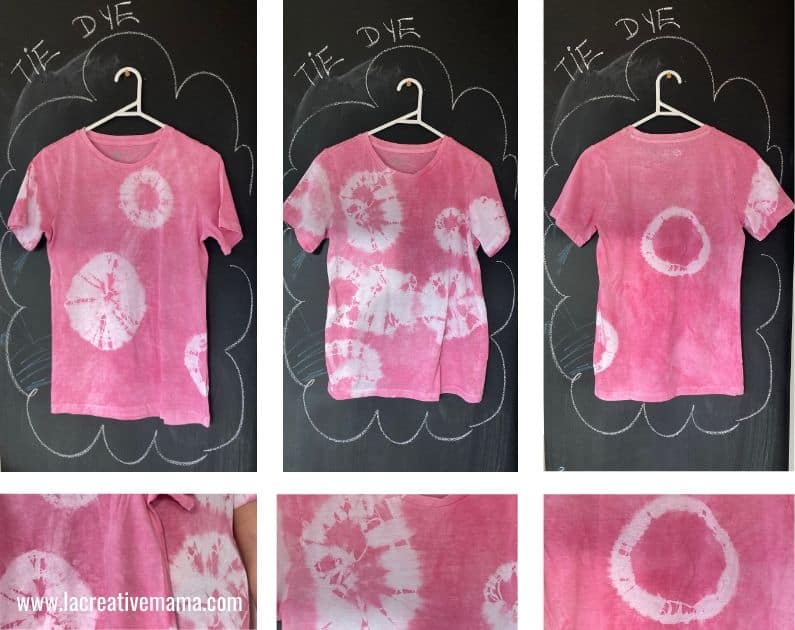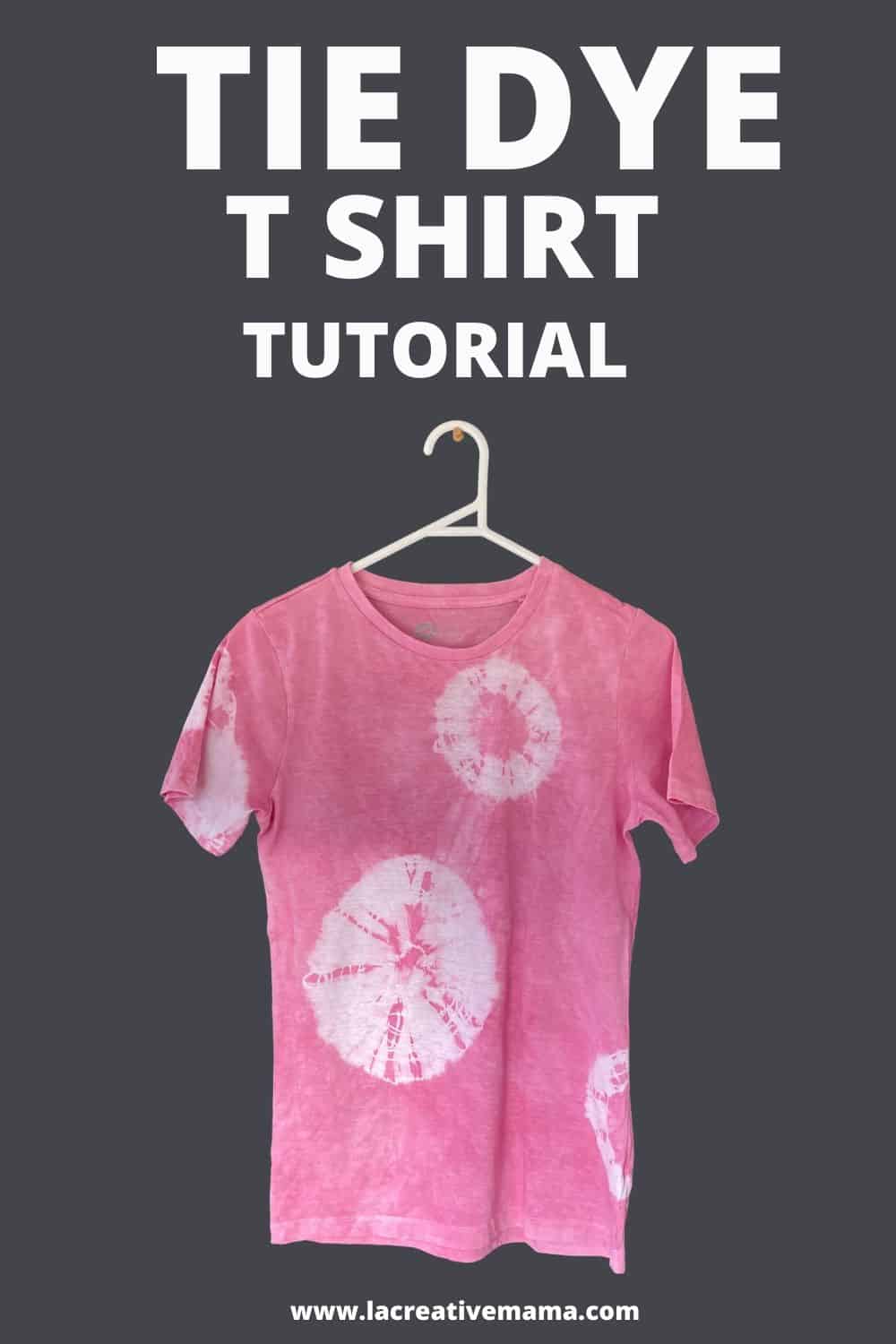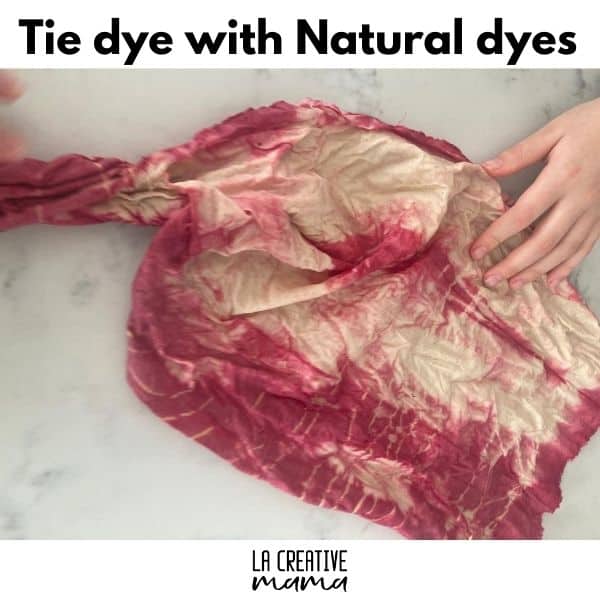Hi Creative Mamas! Are your kids or grandchildren asking you if they can tie dye a t-shirt? Have you ever tried it yourself when you were little?
Have you ever tried it as an adult? It seems to be the latest thing to do: TIE DYE A T-SHIRT.
In my last natural dyeing workshop all my students were so keen to do some tie dye experimentation. So we did, and it was a lot of fun.
We used different dyes which produced many different colors. Check out the best 10 Natural dyes List which I recommend at the bottom of this post!

In this tutorial I will teach you how to tie dye a t-shirt using natural dyes and natural dyeing processes.
I am very aware of the toxic dyes next to our skins so I am always looking for ways to adapt my natural dyeing techniques to the latest trends. In this case I am adapting the super popular “tie dyeing a cotton t-shirt” trend.
Tie dyeing a t-shirt with natural dyes can be the best option if you want to:
- Make a gift for someone special
- If you or your kids have skin allergies
- If you want to share a super fun activity with your kids
- Create a brand new colorful wardrobe in an afternoon 🙂
How to tie dye a t-shirt tutorial
This post contains affiliate links, which means I receive a small commission, at no extra cost to you, if you make a purchase using this link. Please see my disclosure for more details
Materials and Equipment
- 100 % cotton T-shirt
- Aluminium Acetate
- Soda Ash
- Neutral soap
- Cochineal extract (any natural dye extract will work)
- Rubber bands
- Stainless steel pot for dyeing
- Kitchen scale
Step 1:
The first step is to weigh your t-shirts. This step is very important in natural dyeing because it will determine how much dye and mordant to use.
The formulas for mordanting and dyeing will be directly related to the WOF (weight of fabric).
So, weigh your t- shirt or t-shirts while they are dry using a kitchen scale. For this tutorial I am dyeing 2 t- shirts and they weigh 200 grs.
NOTE: Be sure to confirm that your t -shirts are truly 100% cotton, check the label! If you are sewing the t- shirts yourself you can do a FABRIC BURN TEST to test the fabric composition before you sew it 🙂
Step 2:
In natural dyeing we always wash the fabric and then we mordant it, unless you are using a substantive dye in which case you don’t need to mordant.
This ensures that by washing the t- shirt we are removing all chemical processes that may inhibit the dye from penetrating into the fiber.
After the washing process we need to mordant to make sure that the fiber opens up in order to receive the dyes. This step is called SCOURING.

Fill a pot with hot water. Add 1 tablespoon of neutral PH soap (The soap I have recommended in the list of materials comes in a bar so you can grate it and add it to the water) and 1 tablespoon of soda ash.
Stir and place t-shirts inside the pot. Bring the pot to a boil and boil the fabric for 1 1/2 to 2 hours until the water is yellow. Rinse well.
Step 3:
The next step is to do the MORDANTING. For each 100 grams of dry fabric/yarn you will need between 10 grams and 25 grams of Alum Acetate (check the manufacturers suggested measure) and 6 grams of soda ash.
Imperial measurements: For each 4 oz of dry fabric you will need 40fl oz of Allum Acetate check the manufacturers suggested measure) and 10fl oz of soda ash.

Fill a stainless steel pot with hot water (2/3 full) and dissolve the allum. Stir well. Add the soda ash.
Some bubbles may appear, this is the carbon dioxide being released. Make sure you are wearing a mask 😊 and that you are in a well ventilated area.

When all bubbles are gone, add your wet-shirts to the bath and raise the temp to a simmering point: 88 degrees C or 190 degrees F. Remove from the stove and leave soaking overnight. Make sure you rinse well before dyeing.

Step 4:
We need to prepare the color dye. For this step I suggest that you use natural dye extracts because they come ready to be used. This means that you don’t need to extract the color from the plant or flower, etc.
All that hard work has been done for you and you simply need to dissolve the extract powder into some water.
What dyes to use?
You can get dye extracts in a variety of dyes. Check out the best 10 Natural dyes List which is free for you to download at the bottom of this post 🙂
How to calculate how much natural dye I need?
For this tutorial I am going for a soft pink.
The rule of thumb in natural dyeing is that you use as much dye as 100% of the weight of your fabric. In this case my 2 t-shirts weigh 200 grams which means that if I want a very rich hot pink I would need to use 200 grams of cochineal.
In this case I am going for a pale pink so if I was using cochineal bugs I would use 1/4 of that amount (50 grams).
I am using extract so my manufacturers instructions said that 5 grams of extract would dye 100 grams of fabric. Therefore, I used 4 grams of extract for 200 grams of t-shirting cotton. I am anticipating that this will produce a soft pink.
Measure the extract powder and dissolve into a small amount of hot water. Stir to make a paste.

Add some more hot water and add the whole dye solution into the big stainless steel pot which should be 2/3 full with lukewarm water. Dissolve well.

Step 5:
This is the super fun part!!!! Grab the rubber bands and make little bunches in the t-shirt. The idea is to secure the rubber bands really tightly so that they will act as a resist.
This means that where the rubber band is pressing against the fabric, the dye will not be able to reach and that area will remain white.

So have fun and create random bunches with the rubber band! This is the “tie” part of this tutorial 🙂

Step 6:
Once you are happy with your ties it’s time to immerse the t-shirts into the dye bath, as shown in the illustration below. Make sure there is enough water to cover all the fabric fully and that the fabric can move freely within the bath.

Bring to a simmer and continue simmering for 1 whole hour.

Step 7:
Remove from the dye bath and rinse well.

Cut and remove rubber bands.


Rinse again and leave to dry. It will dry 2 shades lighter.

The reveal!
Beautiful cotton t-shirts! Great for gifts, great to update the wardrobe and best of all we had so much fun with my daughter 🙂 She is now planning a yellow and a green version!!!

Want to learn how to make your very OWN natural dyes? I’ve got the perfect (FREE) resource just for you! Fill in the form below and get access to it instantly!
Keen for more tie dye?
Check out this super cool tutorial How to tie dye with natural dyes
Want to remember this? Save this Tutorial to your favorite Pinterest board!



